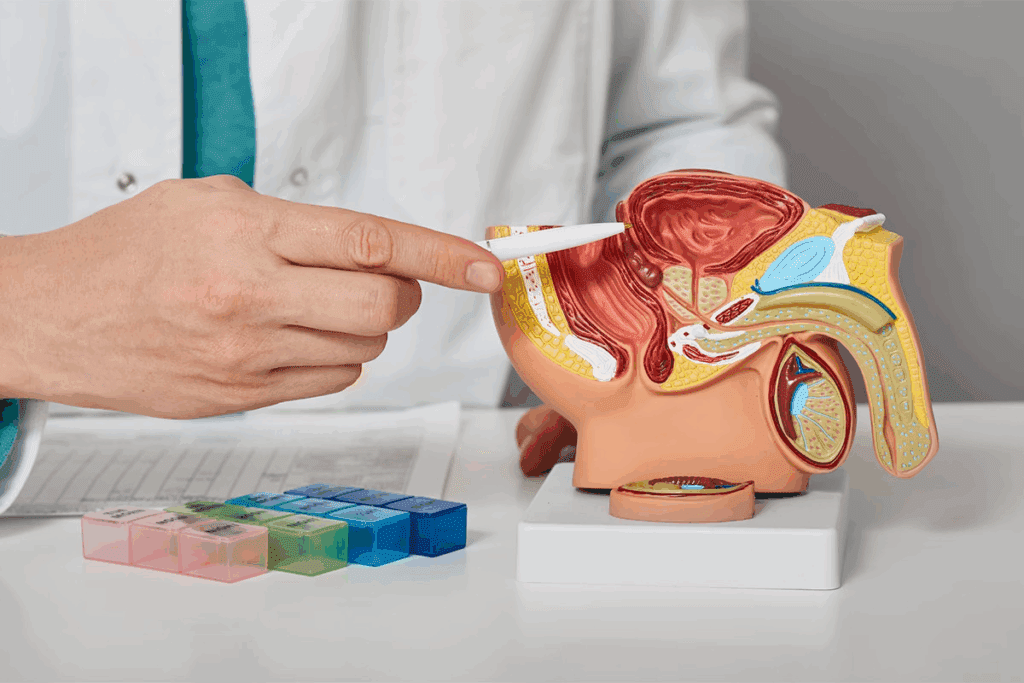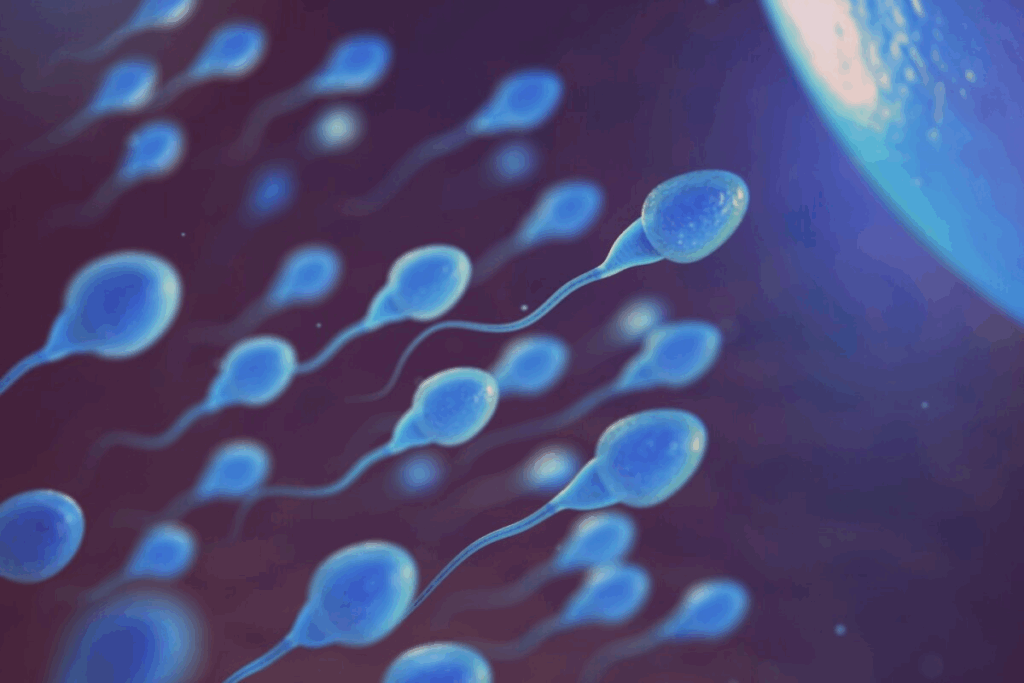Last Updated on November 25, 2025 by Ugurkan Demir

At Liv Hospital, we often hear that men stop making sperm as they get older. But, the truth is more complex. Unlike women, who are born with a set number of eggs, men keep making sperm all their lives. This process, called spermatogenesis, makes a new batch of sperm every 64-74 days when do men stop producing sperm.
Even though men don’t stop making sperm, the quality and how well they move gets worse with age. As men get older, their bodies change in ways that can affect their ability to have children. In this article, we’ll look at these changes and what they mean for men’s health.

Men can produce sperm for their whole lives, which is amazing. This process is key for making babies. It shows how the male body is made to keep making sperm.
Boys start making sperm when they hit puberty. They keep making sperm for most of their lives. A famous fertility expert said,
“Sperm production is a continuous process that regenerates every 64-74 days.”
This never-ending cycle of sperm making shows how strong the male body is. It’s all thanks to parts that work together to keep fertility alive.
Important parts for making sperm include the testes, epididymis, vas deferens, seminal vesicles, prostate gland, and urethra. Each part is vital for making, storing, and moving sperm.
Spermatogenesis is how immature cells in the testes turn into sperm. This complex process has several stages, like growing, dividing, and getting ready. The whole thing takes about 64-74 days and keeps going all a man’s life.
Knowing how sperm making works and the parts involved helps us see how amazing the male body is. It shows how it can keep making sperm for a man’s whole life.

Menopause marks a big change for women, but men don’t have a direct equivalent. Men keep making sperm their whole lives. Yet, they do face changes in their reproductive health as they age.
Women stop making eggs during menopause, usually between 45 and 55. Men, on the other hand, keep making sperm, but the quality and amount might change. The aging of the male reproductive system is slower.
Here’s a table to show the differences:
| Characteristics | Menopause in Women | Andropause in Men |
| Reproductive Capability | Complete cessation of egg production | Gradual decline in sperm quality and testosterone |
| Age of Onset | Typically between 45 and 55 years | Can start around 40, varies widely |
| Hormonal Changes | Significant drop in estrogen levels | Gradual decline in testosterone levels |
Andropause, or “male menopause,” is when testosterone levels drop. It can cause tiredness, less sex drive, and mood swings. But, it doesn’t mean men can’t reproduce anymore.
Men and women both age, but their changes are different. Knowing these differences helps us meet the health needs of older people better.
Sperm production never stops in men, but its quality can change. Men often ask when they stop making sperm. The answer is in the science of male fertility.
Studies show men keep making sperm forever. Unlike women, who are born with a set number of eggs, men make sperm all their lives. Hormones like testosterone and FSH control this process.
The continuous production of sperm shows how amazing our bodies are. But, the quality and amount of sperm can change for many reasons.
Even though men keep making sperm, many things can affect it. Age is a big factor, as it can make sperm move less well and look different. Things like toxins, smoking, and too much alcohol can also harm sperm.
Other things that can change sperm production include:
Knowing about these factors is key for men worried about their fertility. By living healthy and dealing with health issues, men can keep their reproductive health strong.
Men’s fertility changes with age, noticeably after 35. As men get older, their sperm quality and quantity decline. This affects their ability to have children.
Male fertility starts to drop around 35, getting worse after 40. This decline is due to several reasons. These include lower sperm count, motility, and morphology. Also, DNA fragmentation increases, which can cause genetic issues in children.
Research shows that conception rates fall as men get older. For example, men over 40 take longer to conceive. This is important for couples trying to have a baby, as it affects their chances of success.
Sperm health is checked through several important factors:
These factors give a full picture of a man’s reproductive health. They are key in determining fertility.
As men age, a big change happens in their reproductive system. The prostate gland gets bigger, a condition called Benign Prostatic Hyperplasia (BPH).
Benign Prostatic Hyperplasia, or BPH, is common in older men. It makes the prostate gland grow, affecting how men pee and have sex. The more men age, the more BPH they get, hitting most men in their 60s and 70s.
We don’t know exactly why BPH happens, but hormones play a part. The prostate grows, blocking the urethra and making it hard to pee.
BPH messes with both peeing and sex. Symptoms include trouble starting to pee, weak flow, needing to pee a lot, and waking up to pee a lot at night.
| Symptoms | Description | Impact on Quality of Life |
| Difficulty Urinating | Straining or hesitancy when starting to urinate | Can cause discomfort and anxiety |
| Weak Urine Flow | Reduced flow rate or interrupted flow | Affects daily activities and sleep |
| Frequent Urination | Need to urinate more often than usual | Impacts daily routines and social life |
Even though BPH isn’t cancer, it can really hurt a man’s life. Doctors can help with lifestyle changes, meds, or surgery, depending on how bad it is.
Knowing about BPH is key to managing it. Men with symptoms should see a doctor for help.
As men get older, many health issues can affect their sperm. Aging brings changes that can harm reproductive health. We’ll look at the main health problems that affect sperm in older men.
Hormonal changes play a big role in sperm decline in aging men. Testosterone decline is a natural aging process that affects sperm. Lower testosterone levels can harm sperm quality and quantity.
Studies show testosterone levels start to drop after 30. This decline can hurt fertility.
Erectile dysfunction also affects fertility in older men. It’s not directly linked to sperm production but can make it hard to conceive. The link between erectile dysfunction and fertility is complex, involving physical and mental factors.
Erectile dysfunction (ED) is more common with age and can worry men trying to conceive. ED can stem from vascular disease, diabetes, and mental issues. It’s key to address ED for better reproductive health.
Chronic diseases like diabetes, high blood pressure, and obesity can harm sperm. These conditions can lower sperm quality and reproductive health. It’s vital to manage chronic diseases to keep fertility as men age.
Understanding health issues that affect sperm can help men stay fertile. Regular health checks and a healthy lifestyle can help fight age-related fertility changes.
As men get older, their sperm’s genetic quality can decline. This might impact their children’s health. Advanced paternal age is linked to more genetic problems and birth issues. We’ll look into how older dads can affect their kids’ health.
Studies show older dads face a higher chance of having kids with genetic issues. The risk of schizophrenia, bipolar disorder, autism, and Down syndrome goes up with age. This is because older sperm cells are more likely to have DNA mutations.
Genetic mutations pile up in sperm as men age. Sperm cells keep dividing, and with each division, there’s a chance for mistakes. These mistakes can lead to genetic mutations passed to the next generation.
Children of older dads might face health challenges. They could be at a higher risk for neurodevelopmental disorders and genetic syndromes. It’s key for parents-to-be to know these risks when planning a family.
Even so, many men can have healthy kids even in older age. But knowing the genetic risks helps in making smart choices about having children.
As men get older, they can take steps to keep their reproductive health strong. Lifestyle changes and medical care play big roles. Knowing how to handle these changes is key to keeping sperm healthy.
There are many ways to boost sperm health. Eating a balanced diet with antioxidants like vitamins C and E helps protect sperm. Exercise is also good, as it keeps the body healthy and boosts fertility.
It’s also important to avoid bad habits. Smoking and drinking too much alcohol can hurt sperm quality. Stress management, like meditation or yoga, can also help.
Men facing fertility issues have many medical options. Hormone therapy can fix hormone problems that affect sperm. Sometimes, assisted reproductive technologies (ART) like IVF are suggested.
It’s vital for men to talk to doctors about the best treatment for them. This depends on their health and fertility goals.
Men who want to have kids later in life should think about fertility preservation. Sperm banking is a common choice, where sperm is frozen for later use. This is helpful for men facing treatments like chemotherapy.
It’s important for men to understand their options and talk to a healthcare provider. This helps them make smart choices about their reproductive future.
It’s key to understand male fertility as we age. We’ve seen how the male body keeps making sperm all life long. This is important for reproductive health.
Even though men don’t stop making sperm, the quality and amount can drop after 35. Lifestyle, health, and genetics all affect fertility.
Keeping reproductive health in check is vital. Men can boost their fertility with healthy habits and medical help when needed. Issues like benign prostatic hyperplasia and erectile dysfunction can affect health, so it’s important to address them.
Knowing about changes in male fertility helps men take care of their reproductive health. This knowledge lets them make smart choices about family planning. It also helps them get the right medical care, ensuring their reproductive well-being.
Men don’t stop making sperm completely. But, the quality and amount they produce goes down with age.
There’s no exact age when men stop making sperm. But, after 35, the quality and amount of sperm drops a lot.
No, men keep making sperm all their lives. But, the quality and amount may get worse over time.
Men don’t stop making sperm at a certain age. But, after 35, the quality and amount of sperm drops fast.
The prostate gland gets bigger as men age. This can lead to problems like benign prostatic hyperplasia (BPH).
Older dads have a higher risk of genetic problems. This can affect the health of their kids.
Men can keep their sperm healthy by living a healthy lifestyle. They should also manage chronic diseases and think about fertility options.
Yes, a man’s age can affect his fertility. Sperm quality and quantity go down, mainly after 35.
Hormonal changes, erectile dysfunction, and chronic diseases can all hurt sperm production in older men.
Yes, men can look into fertility preservation, like sperm banking, to help meet their reproductive goals.
National Center for Biotechnology Information. When Do Men Stop Producing Sperm At Liv. Retrieved from https://www.ncbi.nlm.nih.gov/pmc/articles/PMC3253726/
Subscribe to our e-newsletter to stay informed about the latest innovations in the world of health and exclusive offers!